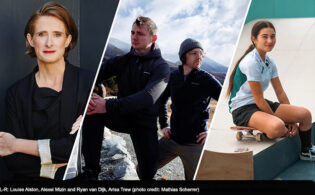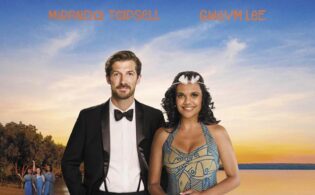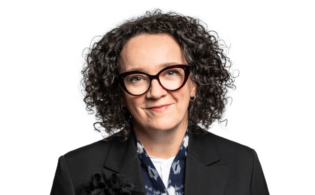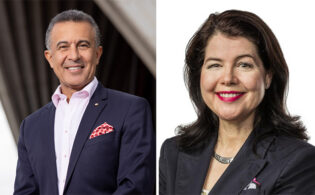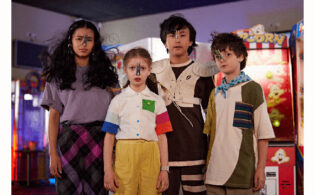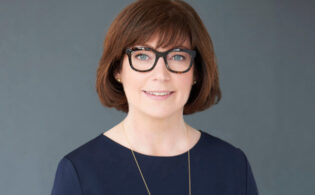Deirdre Brennan worked for years at international companies, most recently as COO of WildBrain and previously as general manager of Universal Kids. At the beginning of 2024, she returned to her native country when she was appointed the CEO of Screen Australia, the federal government agency charged with supporting the development, production, promotion and distribution of Australian film, television, online content and games. Brennan talks to World Screen Weekly about the projects Screen Australia has been funding and their international appeal, the country’s diverse talent pool and the role Australia can play in the current reset of the international scripted market, driven by changing business models and viewing habits and global economic pressure.
WS: To what do you attribute the international appeal of Australian scripted fare?
BRENNAN: I love that question. The content Australia creates, in all its forms, is distinct. When we tell stories that reflect and connect us as Australians, there’s an element of universal appeal that demands attention, particularly in scripted. The shows I’ve discovered in this new role—the range of stories that we tell, our tone of voice and the authentic nature of what we create—are distinctive. Whether it’s Colin from Accounts—and hasn’t that success been driven by the audience? It’s very much an Australian story—High Country, Mystery Road, The Lost Flowers of Alice Hart or Fisk. I think back to Please Like Me, which continues to connect, and the breakthrough film Talk to Me. We have a perspective that resonates internationally.
The second reason is talent. Australia’s environment—our place and people—has fostered incredible creativity, whether it’s established practitioners like Tony McNamara or emerging voices. A great example is Thou Shalt Not Steal, a new series by First Nations creator and director Dylan River. Produced in Alice Springs and commissioned by Stan, a local independent platform, it stars Miranda Otto and Noah Taylor, with two of the young stars from Heartbreak High, Sherry-Lee Watson and Will McDonald. It’s one of the most unique, funny and joyful pieces of content I’ve seen. The show premiered at TIFF, and Stan held a community screening in Alice Springs in October. The heart of that story couldn’t come from any other place.
So, it’s a combination of creatively distinct content and exceptional talent. That’s why we punch above our weight.
WS: Given the talent pool that you have, what is Screen Australia’s remit? How do you support and help?
BRENNAN: I think I have the best job in the world! The three main areas of support are content funding (for development and production), industry development (skills-based training and opportunity creation) and global engagement, where we take Australian creatives to the world. Our primary focus is to support storytelling for Australian audiences, but we are very proud to shout out to the world about that work.
Last year, we delivered nearly a half-billion [Australian] dollars worth of total financial support to the local sector, including the producer offset, which we administer on behalf of the Australian government. When it comes to direct funding, last year, Screen Australia invested AU$85 million across 57 programs and initiatives. We are also the competent authority for co-production, a clear growth area for the industry.
One of my ambitions for Screen Australia is to become a trusted partner and adviser, and that goes well beyond the projects we fund. The unique thing about Screen Australia is that we support all storytelling forms—film, TV, online and games. To be able to foster both talent and IP from the beginning of development through to platform distribution or a direct-to-audience connection they choose is rare. We have a significant role to play as an insights provider and thought leader, not only for the industry but also in supporting the creation of culturally relevant, engaging content for the local audience.
WS: With your background and international experience, you must bring a valuable perspective to the job.
BRENNAN: Yes, the combination of international experience from the U.K. and North America has value, but also from the kids’ and family genre. What that brings to the role, I hope, is an understanding of audiences and the power of research to build a sustainable future where we’re no longer a surfboard on the waves. The market is under pressure, models are changing, and audience behavior is driving significant disruption; our role is to be that steady boat amid the waves.
WS: Screen Australia recently provided AU$8.1 million in funding. What type of projects received assistance?
BRENNAN: We announced AU$8.1 million in production funding for 15 projects, but I prefer to look at funding patterns over time to assess the impact and breadth of our investment. There was a range of content included in that slate across all styles of storytelling, from a documentary format on TikTok to an online series, premium drama and films. This showcases everything we’re trying to achieve for the Australian industry, and I can’t wait to see those projects come to life. The producer offset is a powerful foundation to build on, but I regret that we can only support around 30 percent of the applications that we receive for direct funding. If we’re not involved in funding a project directly, we need to consider how else Screen Australia can assist in getting these stories made.
WS: Production costs are rising everywhere. How is the Australian industry grappling with that? And are financing models evolving? Your co-production background must be very helpful.
BRENNAN: We do need to bring back those skills globally. Production costs and budgets are rising—it’s a universal issue. The question for the industry is, what can we control? How can we shape our destiny when it comes to the types of content we produce? There is no easy solution, and it’s a pivotal time; not a contraction but more of a reset. How do we respond to that reset?
For me, the answer is understanding audiences and developing stories for those audiences before we even think about a budget or a platform. Content creation has been democratized; we’ve been talking about that for the last five years. It’s now about to be revolutionized, and we see a convergence of the means of content production, community and technology. For the first time, there was a realistic acknowledgment at MIPCOM about the need to pull production budgets down. It’s about focusing on who’s going to love a story and how to bring it to life without connecting production cost with the quality of that storytelling.
So, if there’s a market reset driven by changing business models and global economic pressure, we have to explore how to respond. Something will come from this moment. We’ll continue to support a sustainable future industry and provide opportunities for a new wave of creators in Australia. They are not constrained by concerns around production budgets; they find a way to tell their stories. Maybe the expectation we put on ourselves around quality also needs a reset. It’s complicated, but every time we come together as an industry to address these questions, it’s a step forward.
WS: How do you view the next 12 to 24 months?
BRENNAN: There’s an incredible opportunity for Australia. We have such strong incentives, and part of Screen Australia’s role is to communicate that. We have a stable economic and industrial outlook, which is positive. Importantly, we have a creative mindset and a collaborative reputation. We’re also deeply connected to the oldest living storytelling culture in the world. Put these factors together and we’re an extraordinary place for the world to partner with.
When it comes to potential creative partnerships with Europe, Canada and the Asia-Pacific region, if we’re motivated to work together through economic necessity, society will benefit from that. I am passionate about the power of co-production, and Australia is poised to be an important part of that future. It’s a challenging time but also an exciting one.
WS: And don’t challenges often spark creativity and new and maybe better ways of doing things that you hadn’t thought of before?
BRENNAN: More than ever. The world is seeing the strength of community at the same time as being nervous about the impact of technology. But the more we understand it, the more we’ll be able to be that boat.
